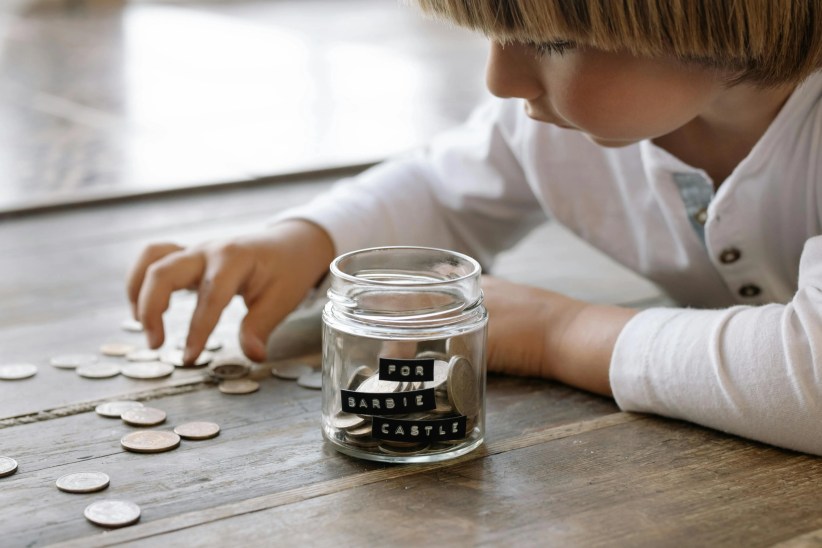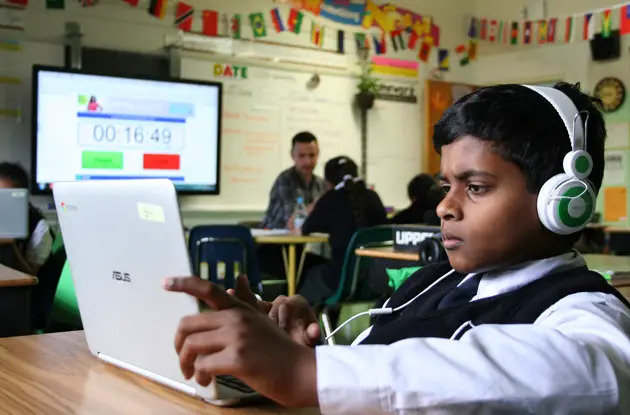The iTunes store is flooded with “educational” apps—but how the heck can you really know which ones are worth your child’s time? Here, our expert selects 8 winners that can help your child with the skill of remembering.
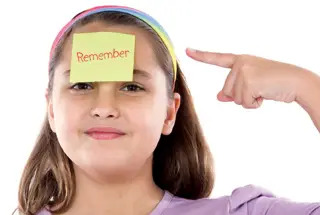
Our schools’ emphasis on and devotion to standards-based instruction and high-stakes testing reflects a desire for students to become proficient at memorizing terms and facts as well as and mastering various sets of skills. Yet we live in an age of “too much information” where facts are readily available on the mobile devices carried in our pockets. Knowledge is now accessible with just a swift swipe of a finger. The level of immediacy that mobile technology offers is changing the landscape of the classroom and the skill set of the future workforce. More than ever, we need a nation of critical thinkers, able to successfully navigate the growing complexities of our world, and not just be proficient at recalling memorized information or using rote skills.
Educators sensitive to these changing needs are embracing an updated version of Bloom’s Taxonomy.* What I mull over is how instruction using mobile technology can contribute to this type of thinking. That these new, promising mobile devices often house apps offering more of the same drill-and-kill activities we desire to minimize is a limitation. In attempts to integrate mobile technology, educators are left to the mercy of app developers who or may or may not fully understand how imperative it is that our children become critical and creative thinkers.
In this series, which first appeared on Edutopia.org, I will highlight apps useful for developing higher order thinking skills in grades K-5 classrooms. Each list will highlight a few apps that connect to the various stages on the continuum of learning. First up: remembering.
*Without getting too technical (hey, we’re not all certified teachers!), this theory essentially delineates the six cognitive processes that lead to true learning and critical thinking—children must be able to remember, understand, apply, analyze, evaluate, and create. We’ll cover apps for each of these skills in upcoming issues, courtesy of edutopia.org.
REMEMBERING
Apps that fit into the “remembering” stage improve the user’s ability to define terms, identify facts, and recall and locate information. Verbs commonly used to describe this phase include finding, labeling, listing, selecting, retaining, naming, retrieving, recognizing, registering, or realizing. Many educational apps fall into the “remembering” phase of learning. They ask users to select an answer out of a line-up, find matches, and sequence content or input answers.
Word BINGO
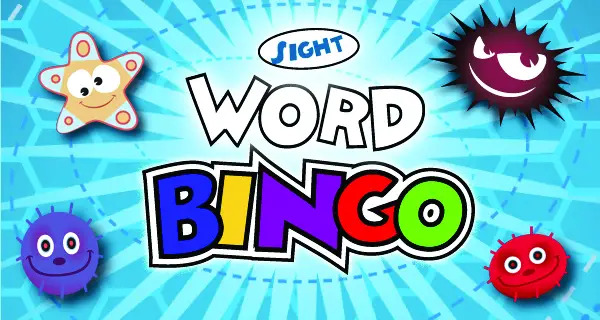 Word BINGO helps beginning readers recognize and locate more than 300 sight words. The words originate from pre-primer, primer, first grade, second grade, and third grade Dolch word lists. Using a Bingo game format, children tap each word read aloud. When they score a “BINGO,” they collect a cute animated bug. Other features include spelling practice, an interactive word block tower, and engaging opportunities to fling bugs into a warp zone when a child identifies a word correctly. The settings are adjustable and the report card reflects a transcript of the child’s performance. The app can hold up to five accounts and one open slot for a visiting “guest.” This is definitely a fun alternative to flash cards. ($0.99)
Word BINGO helps beginning readers recognize and locate more than 300 sight words. The words originate from pre-primer, primer, first grade, second grade, and third grade Dolch word lists. Using a Bingo game format, children tap each word read aloud. When they score a “BINGO,” they collect a cute animated bug. Other features include spelling practice, an interactive word block tower, and engaging opportunities to fling bugs into a warp zone when a child identifies a word correctly. The settings are adjustable and the report card reflects a transcript of the child’s performance. The app can hold up to five accounts and one open slot for a visiting “guest.” This is definitely a fun alternative to flash cards. ($0.99)
Rocket Math
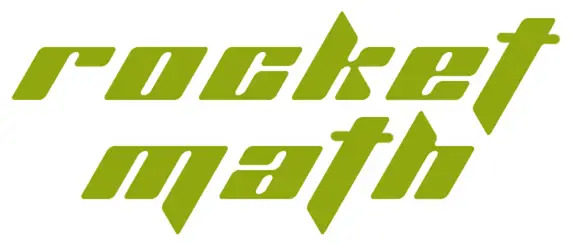 Last winter, while overseeing the library during recess, I noticed a large number of boys crammed around an iPad. I was immediately suspicious. Why were they all swarming together, and furthermore what could possibly be attracting a large number of boys to the library during recess? They were playing Rocket Math! This app cleverly integrates learning math with experimenting with rocket design. Students can practice reciting math facts, counting money, telling time, recognizing fractions, decimals, geometric shapes, number patterns, and even square roots. Every time a child completes a task, he earns money that can purchase rocket parts. This appears to be an exceptional motivator! ($0.99)
Last winter, while overseeing the library during recess, I noticed a large number of boys crammed around an iPad. I was immediately suspicious. Why were they all swarming together, and furthermore what could possibly be attracting a large number of boys to the library during recess? They were playing Rocket Math! This app cleverly integrates learning math with experimenting with rocket design. Students can practice reciting math facts, counting money, telling time, recognizing fractions, decimals, geometric shapes, number patterns, and even square roots. Every time a child completes a task, he earns money that can purchase rocket parts. This appears to be an exceptional motivator! ($0.99)
Shake-a-Phrase
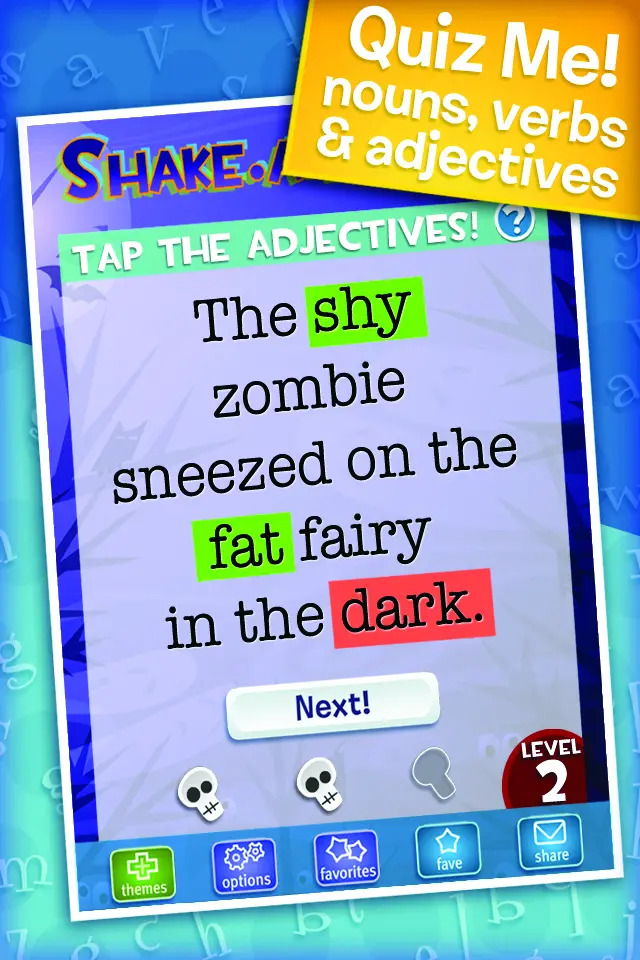 Very often, apps ask children to recognize information in isolation and fail to connect the learning experience to a meaningful purpose. Shake a Phrase is a bit different. This app asks students to identify adjectives, nouns, and verbs within the context of a sentence. This slight adjustment makes this grammar app stand out from the others. Other features include silly sentences that have a built-in dictionary. Hold a finger on a new vocabulary word and a definition appears. There are also “Story Starters” meant to serve as inspiration for creative writing. Shake a Phrase is perfect for second or third grade students. ($1.99)
Very often, apps ask children to recognize information in isolation and fail to connect the learning experience to a meaningful purpose. Shake a Phrase is a bit different. This app asks students to identify adjectives, nouns, and verbs within the context of a sentence. This slight adjustment makes this grammar app stand out from the others. Other features include silly sentences that have a built-in dictionary. Hold a finger on a new vocabulary word and a definition appears. There are also “Story Starters” meant to serve as inspiration for creative writing. Shake a Phrase is perfect for second or third grade students. ($1.99)
Splash Math Summer Math Workbook
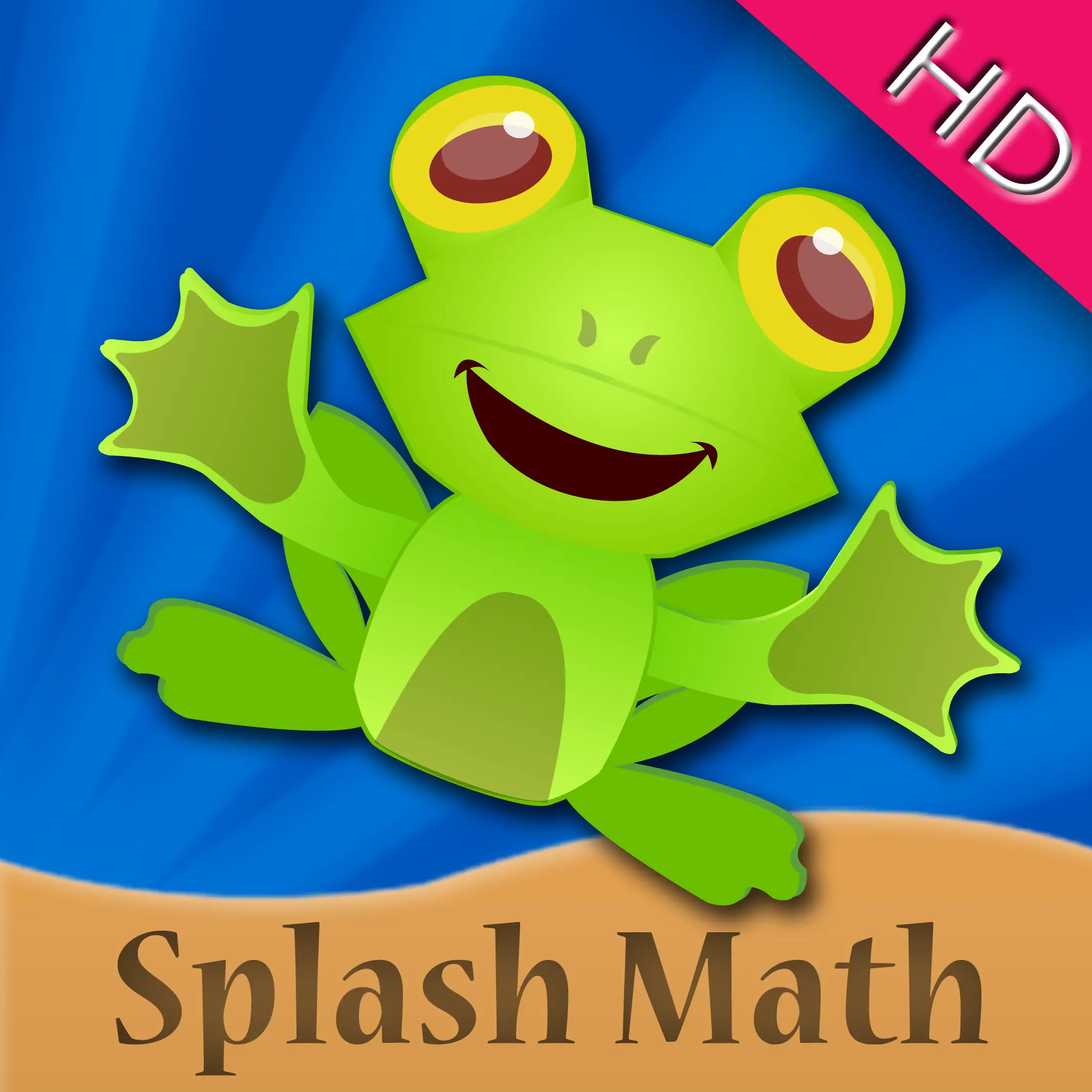 Splash Math is designed to help second and third grade students retain math knowledge over the long summer months. As a result, its contents are extremely comprehensive. There are countless opportunities to recall math facts, recognize fractions, identify place value, money, and develop number sense. Individualizing instruction is as easy as adjusting the play mode settings. The app also has a very comprehensive report card that tracks student performance. A separate activity card acts as a journal of daily progress. There are five user accounts to one app. The profile settings include an option to enter an email address. Having this information enables the sharing of performance reports. Children collect points as they complete tasks that will buy cute ocean characters for a virtual aquarium. ($4.99)
Splash Math is designed to help second and third grade students retain math knowledge over the long summer months. As a result, its contents are extremely comprehensive. There are countless opportunities to recall math facts, recognize fractions, identify place value, money, and develop number sense. Individualizing instruction is as easy as adjusting the play mode settings. The app also has a very comprehensive report card that tracks student performance. A separate activity card acts as a journal of daily progress. There are five user accounts to one app. The profile settings include an option to enter an email address. Having this information enables the sharing of performance reports. Children collect points as they complete tasks that will buy cute ocean characters for a virtual aquarium. ($4.99)
MindSnacks French, Italian, and Spanish
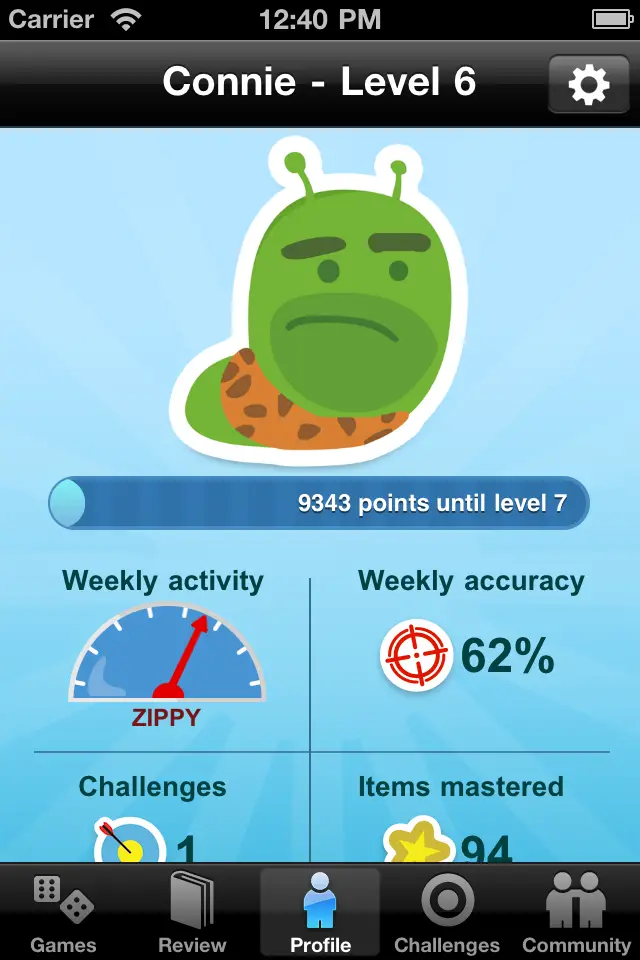 The MindSnacks language learning apps help users memorize and retain French, Italian, or Spanish words and phrases. The integration of video clips provides a model for pronunciation. The characters and game format is fun and engaging. MindSnacks also responds to the user’s performance and alters the difficulty level. Using a spiral method of teaching, they constantly review previously taught vocabulary. The account profile reports on the users current level, weekly activity, accuracy, and the number of challenges and items mastered. There can be only one user account per app. In order to create a profile it is necessary to enter an email address. (Free.)
The MindSnacks language learning apps help users memorize and retain French, Italian, or Spanish words and phrases. The integration of video clips provides a model for pronunciation. The characters and game format is fun and engaging. MindSnacks also responds to the user’s performance and alters the difficulty level. Using a spiral method of teaching, they constantly review previously taught vocabulary. The account profile reports on the users current level, weekly activity, accuracy, and the number of challenges and items mastered. There can be only one user account per app. In order to create a profile it is necessary to enter an email address. (Free.)
Word Cub
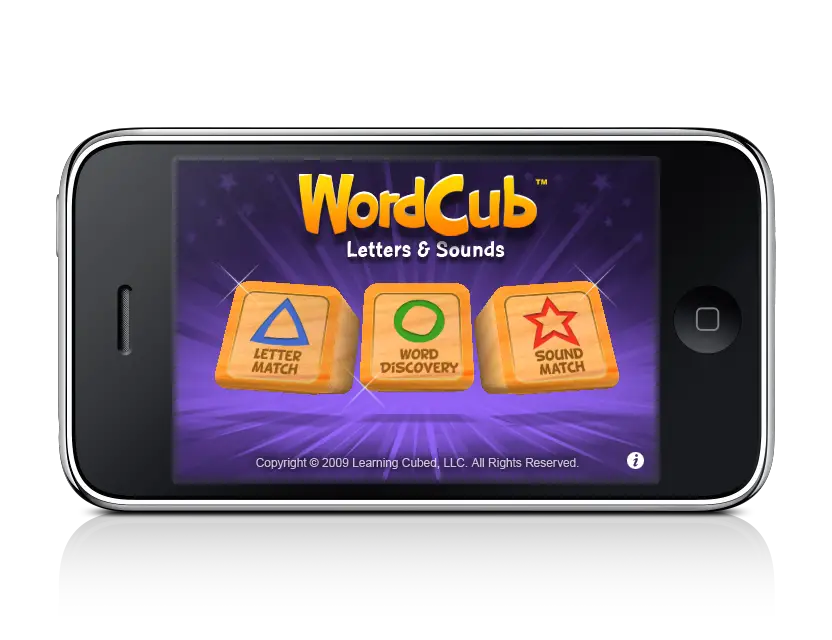 This is a great app to help young children learn letter names and sounds. It also nicely models the blending of letter sounds to make words. Children can listen and then match the correct letter names or sounds, or practice reading across a word. Adjust the settings and the blocks display either upper case or lower case letters. The words all use short vowels. Select the consonant letter blends for the initial sounds and the task just got a bit more difficult. With a left-to-right sweep of the finger, children can hear how letter sounds blend to create a word. This app helps children recognize letter names and sounds and recognize directionality and blending. ($1.99)
This is a great app to help young children learn letter names and sounds. It also nicely models the blending of letter sounds to make words. Children can listen and then match the correct letter names or sounds, or practice reading across a word. Adjust the settings and the blocks display either upper case or lower case letters. The words all use short vowels. Select the consonant letter blends for the initial sounds and the task just got a bit more difficult. With a left-to-right sweep of the finger, children can hear how letter sounds blend to create a word. This app helps children recognize letter names and sounds and recognize directionality and blending. ($1.99)
Rootology
 Rootology can help upper elementary students recognize common prefixes, suffixes, as well as Greek and Latin word roots. Using a flashcard and multiple-choice format, students can drill themselves for hours. It includes a progress report that gives the user an overall performance GPA. What makes this app stand out is that the sequence of the questions develops the ability to decipher the meaning of a word. The questions address each segment of a word separately, and then the final question confronts the word’s definition. Students will walk away from this app able to recall the meaning of word roots and the skills to define new vocabulary. (iPhone: $0.99. iPad: $2.99)
Rootology can help upper elementary students recognize common prefixes, suffixes, as well as Greek and Latin word roots. Using a flashcard and multiple-choice format, students can drill themselves for hours. It includes a progress report that gives the user an overall performance GPA. What makes this app stand out is that the sequence of the questions develops the ability to decipher the meaning of a word. The questions address each segment of a word separately, and then the final question confronts the word’s definition. Students will walk away from this app able to recall the meaning of word roots and the skills to define new vocabulary. (iPhone: $0.99. iPad: $2.99)
Mental Case Classroom Edition
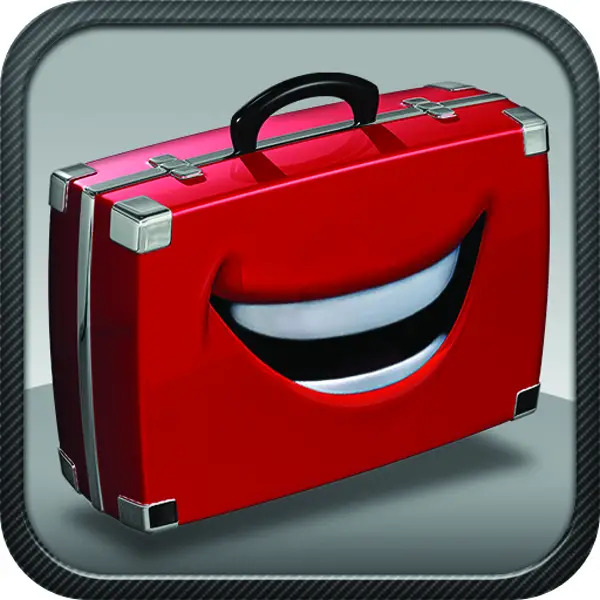 Mental Case is a flashcard app on steroids. The reason why I am highlighting this particular flashcard app is the diverse forms of media it embraces and the wonderful way it organizes your files. Take a photograph with your iPad or iPhone and place it directly onto a card. It is also possible to embed or record audio, import images from iPhoto, and present flashcards to others as a slideshow. Possibly navigating this app is too much of a stretch for an elementary age student. Then consider creating your own deck for children to upload directly from iTunes. Better than that, use FlashcardExchange.com and access pre-made files! The possibilities and depth in which this app can function is extremely impressive. Mental Case will help students remember anything. (Free.)
Mental Case is a flashcard app on steroids. The reason why I am highlighting this particular flashcard app is the diverse forms of media it embraces and the wonderful way it organizes your files. Take a photograph with your iPad or iPhone and place it directly onto a card. It is also possible to embed or record audio, import images from iPhoto, and present flashcards to others as a slideshow. Possibly navigating this app is too much of a stretch for an elementary age student. Then consider creating your own deck for children to upload directly from iTunes. Better than that, use FlashcardExchange.com and access pre-made files! The possibilities and depth in which this app can function is extremely impressive. Mental Case will help students remember anything. (Free.)
Criteria to Consider
When evaluating these “remembering” apps, ask the following questions:
Does the app help the user:
• Define information?
• Name facts?
• Recite information?
• List facts or details?
• Recall facts or ideas?
• Locate facts or ideas?
• Retrieve information?
• Describe information?
• Recognize facts or ideas in context?
Additionally it is helpful to also consider the following elements:
• Does the app employ playful, interactive formats that captivate the user’s attention? Making learning fun is a very valuable component, and if the app is also cognitively demanding, can help learning to “stick.”
• Does the app include performance summaries? This will make it much easier for educators and learners to share results and target personal instruction needs.
Diane Darrow is an artist, reading recovery teacher, and library media specialist. You can follow her on Twitter, and find more of her valuable educational insights (including more in her series on the best educational apps) at Edutopia.















